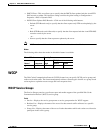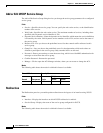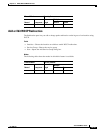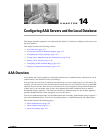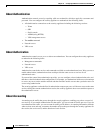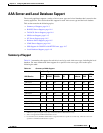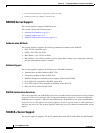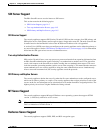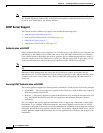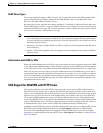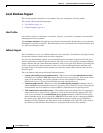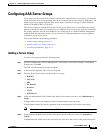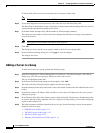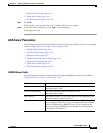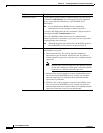
14-5
Cisco ASDM User Guide
OL-16647-01
Chapter 14 Configuring AAA Servers and the Local Database
AAA Server and Local Database Support
SDI Server Support
The RSA SecurID servers are also known as SDI servers.
This section contains the following topics:
• SDI Version Support, page 14-5
• Two-step Authentication Process, page 14-5
• SDI Primary and Replica Servers, page 14-5
SDI Version Support
The security appliance supports SDI Version 5.0 and 6.0. SDI uses the concepts of an SDI primary and
SDI replica servers. Each primary and its replicas share a single node secret file. The node secret file has
its name based on the hexadecimal value of the ACE/Server IP address with .sdi appended.
A version 5.0 or 6.0 SDI server that you configure on the security appliance can be either the primary or
any one of the replicas. See the “SDI Primary and Replica Servers” section on page 14-5 for information
about how the SDI agent selects servers to authenticate users.
Two-step Authentication Process
SDI version 5.0 and 6.0 uses a two-step process to prevent an intruder from capturing information from
an RSA SecurID authentication request and using it to authenticate to another server. The Agent first
sends a lock request to the SecurID server before sending the user authentication request. The server
locks the username, preventing another (replica) server from accepting it. This means that the same user
cannot authenticate to two security appliances using the same authentication servers simultaneously.
After a successful username lock, the security appliance sends the passcode.
SDI Primary and Replica Servers
The security appliance obtains the server list when the first user authenticates to the configured server,
which can be either a primary or a replica. The security appliance then assigns priorities to each of the
servers on the list, and subsequent server selection derives at random from those assigned priorities. The
highest priority servers have a higher likelihood of being selected.
NT Server Support
The security appliance supports Microsoft Windows server operating systems that support NTLM
version 1, collectively referred to as NT servers.
Note NT servers have a maximum length of 14 characters for user passwords. Longer passwords are truncated.
This is a limitation of NTLM version 1.
Kerberos Server Support
The security appliance supports 3DES, DES, and RC4 encryption types.



